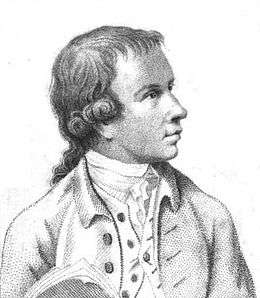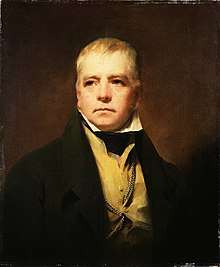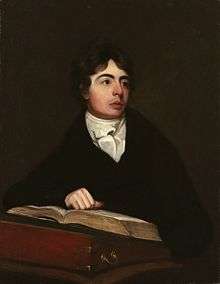
But mark how just the ways of Heaven:
True joy to all is free.
Nor wealth nor knowledge grant the boon:
'Tis thine, O conscience, thine alone,
It all belongs to thee.
William Julius Mickle (29 September 1734 – 28 October 1788) was a Scottish poet.
Quotes
- Knowledge or wealth to few are given,
But mark how just the ways of Heaven:
True joy to all is free.
Nor wealth nor knowledge grant the boon:
'Tis thine, O conscience, thine alone,
It all belongs to thee.- Knowledge: an Ode (c. 1761)
- Dull as a twice-told tale.
- A Night Piece (c. 1761)
- Thousands of angels at thy gate,
And great archangels stand,
And twenty thousand chariots wait,
Great Lord, thy dread command!
Through all thy great, thy vast domains,
With godlike honours clad,
Captivity in captive chains
Triumphing thou hast led.- Paraphrase of the 68th Psalm
- There, where the cross in hoary ruin nods,
And weeping yews o'ershade the lettered stones,
While midnight silence wraps these dark abodes,
And soothes me wand'ring o'er my kindred bones,
Let kindled fancy view the glorious morn,
When from the bursting graves the dust shall rise,
All nature smiling, and, by angels borne,
Messiah's cross, far blazing o'er the skies.- Pollio: an Elegy (written 1762; published 1765)
- When nature's happiest touch could add no more,
Heaven lent an angel's beauty to her face.- Mary, Queen of Scots: an Elegy (1770)
- Awake, ye West Winds, through the lonely dale,
And Fancy, to thy fairy bower betake;
Even now, with balmy freshness breathes the gale,
Dimpling with downy wing the stilly lake;
Through the pale willows faltering whispers wake,
And Evening comes with locks bodropp'd with dew;
On Desmond's mouldering turrets slowly shake
The trembling rye-grass and the harehell blue,
And ever and anon fair Mulla's plaints renew.- Sir Martyn (1777), Canto I, stanza 1
The Mariner's Wife (1769)
- But are ye sure the news is true—
And are ye sure he's weel?
Is this a time to think o' wark?—
Ye jades, fling by your wheel!- St. 1
- For there's nae luck about the house,
There's nae luck at a';
There's little pleasure in the house
When our gudeman's awa'.- St. 1
- Sae true's his words, sae smooth's his speech,
His breath like caller air,
His very foot has music in't
As he comes up the stairs:
And will I see his face again!
And will I hear him speak!- St. 5
- The present moment is our ain,
The neist we never saw!- St. 6
The Lusiad; Or, The Discovery of India: an Epic Poem (1776)
- Nor let the critic, if he find the meaning of Camoens in some instances altered, imagine that he has found a blunder in the Translator. ... It was not to gratify the dull few, whose greatest pleasure in reading a translation is to see what the author exactly says; it was to give a poem that might live in the English language which was the ambition of the Translator. ... And the original is in the hands of the world.
- Introduction (p. cli)

And lifts her lovely head above the wave.
- The moon, full-orbed, forsakes her watery cave,
And lifts her lovely head above the wave;
The snowy splendours of her modest ray
Stream o'er the glistening waves, and quivering play;
Around her, glittering on the heaven's arched brow,
Unnumbered stars, enclosed in azure, glow,
Thick as the dew-drops of the April dawn,
Or May-flowers crowding o'er the daisy lawn;
The canvas whitens in the silvery beam,
And with a mild pale-red the pendants gleam;
The masts' tall shadows tremble o'er the deep;
The peaceful winds a holy silence keep;
The watchman's carol, echoed from the prows,
Alone, at times, awakes the still repose.- Book I, lines 417–430 (pp. 23–24)
Cumnor Hall (1784)
- Note: This ballad inspired Walter Scott to write his novel Kenilworth.
- The dews of summer night did fall;
The moon, sweet regent of the sky,
Silvered the walls of Cumnor Hall
And many an oak that grew thereby.- Stanza 1, quoted in Walter Scott's Kenilworth (1821), Ch. 6. Compare: "Jove, thou regent of the skies", Alexander Pope, The Odyssey, book ii, line 42; "Now Cynthia, named fair regent of the night", John Gay, Trivia, book iii; "And hail their queen, fair regent of the night", Erasmus Darwin, The Botanic Garden, part i, canto ii, line 90.
"Leicester," she cried, "is this thy love
That thou so oft hast sworn to me,
To leave me in this lonely grove,
Immured in shameful privity?"No more thou com'st with lover's speed,
Thy once beloved bride to see;
But be she alive, or be she dead,
I fear, stern Earl, 's the same to thee."Not so the usage I received
When happy in my father's hall;
No faithless husband then me grieved,
No chilling fears did me appall."I rose up with the cheerful morn,
No lark more blithe, no flower more gay;
And like the bird that haunts the thorn,
So merrily sung the livelong day."If that my beauty is but small,
Among court ladies all despised,
Why didst thou rend it from that hall,
Where, scornful Earl, it well was prized?"- Stanzas 3–7
- And ere the dawn of day appear'd,
In Cumnor Hall, so lone and drear,
Full many a piercing scream was heard,
And many a cry of mortal fear.- Stanza 25
- The death-bell thrice was heard to ring,
An aerial voice was heard to call,
And thrice the raven flapp'd its wing
Around the towers of Cumnor Hall.- Stanza 26, quoted in Walter Scott's Kenilworth, Ch. 41.
Quotes about Mickle


- If any author has recovered the freedom of Dryden, without losing the harmony or the force of Pope, it is Mickle, in some parts of his excellent translation of the Lusiad.
- John Adams, Flowers of Ancient History (1789), Ch. 97, p. 283
- There's nae luck about the house...is positively the finest love ballad in that style in the Scottish or perhaps any other language.
- Robert Burns, letter to George Thomson (September 1793), in The Works of Robert Burns (1826), p. 213
- The Lusiad is best known in England by the translation of Mickle, who has been thought to have done something more than justice to his author, both by the unmeasured eulogies he bestows upon him, and by the more substantial service of excelling the original in his unfaithful delineation. The style of Mickle is certainly more poetical, according to our standard, than that of Camoens, that is, more figurative and emphatic; but it seems to me replenished with commonplace phrases, and wanting in the facility and sweetness of the original; in which it is well known that he has interpolated a great deal without a pretence.
- Henry Hallam, Introduction To The Literature Of Europe, Vol. II (1839), p. 178
- His manners were not of that obtrusive kind by which many men of the second or third order force themselves into notice. A very close observer might have passed many hours in Mr. Mickle's company without suspecting that he had ever written a line of poetry. ... When his name was announced, he has been more than once asked if the translator of Camoens was any relation to him. To this he usually answered, with a good-natured smile, that they were of the same family.
- John Ireland, in The Gentleman's Magazine, Vol. 58 (1788), Part 2, p. 1122
- Who that has read the late Mr. Mickle's version of the Lusiad, but must wish he had turned his thoughts to the Æneid? He would probably have had the same success with Virgil as with Camoens.
- Robert Jephson, Roman Portraits (1794), p. 196
- I am glad, Sir, it has fallen into your hands.
- Samuel Johnson's reply to Mickle when told of his plans to translate The Lusiads into English; Dr. Johnson "had much earlier proposed to translate the work himself" – as reported in The Samuel Johnson Encyclopedia (Greenwood Publishing Group, 1996), p. 264.
- I have had occasion lately to look into Mickle's translation of the Lusiad. It is easily and gracefully versified, but properly speaking is not a translation, but a very free paraphrase, or rifacimento of the original. I have been amazed to find what long passages of his own the writer has interpolated into the work. He does not even follow the division into stanzas, but recasts the whole into English couplets. This, to me, is a fatal error.
- Henry Wadsworth Longfellow, letter to Dom Pedro II (1877), published in The Letters of Henry Wadsworth Longfellow, Vol. 5 (Harvard University Press, 1982), p. 323
- Mickle, who bade the strong poetic tide
Roll o'er Britannia's shores in Lusitanian pride.- Thomas James Mathias, The Pursuits of Literature (1794), lines 73–74
- A man of genius, and of great poetical powers. He translated the Lusiad of Camoens in free paraphrastic manner, but with the spirit of an original poet. I could never account for the neglect of so very poetical a work.
- Thomas James Mathias, The Pursuits of Literature (1794), footnote on p. 17
- 'But how we boom through the billows!' cried Jack, gazing over the top-rail; then, flinging forth his arm, recited:
Camoens! White Jacket, Camoens! Did you ever read him? The Lusiad, I mean? It's the man-of-war epic of the world, my lad. Give me Gama for a commodore, say I—noble Gama! And Mickle, White Jacket, did you ever read of him? William Julius Mickle? Camoens's translator? A disappointed man, though, White Jacket. Besides his version of The Lusiad, he wrote many forgotten things. Did you ever see his ballad of "Cumnor Hall"?—No?—Why, it gave Sir Walter Scott the hint of Kenilworth. My father knew Mickle when he went to sea on board the old Romney man-of-war...'' "Aslope, and gliding on the leeward side,
The bounding vessel cuts the roaring tide."- Herman Melville, White-Jacket (1850), Ch. 65, p. 259
- Read the Lusiad in Mickle's translation, and the Eneid in its native strain: and, unless classical prejudices interpose, you will undoubtedly prefer Mickle; though it may appear strange that the version of a modern poem should outvie the original of the finest ancient epic. Such an eclipse seems a phenomenon in literature: but the Lusiad, perhaps, is become brilliant by transfusion.
- Richard Polwhele, Discourses on different Subjects, second edition (1791), as quoted in The Critical Review, Vol. II (1791), p. 370
- It is impossible for me not to approve of the verses of the translator of the Lusiad, which without flattery, in my poor opinion, are equal if not superior to Pope's translation of the Iliad.
- George Brydges Rodney, 1st Baron Rodney, letter to W. J. Mickle (16 May 1788), as quoted in The Scots Magazine, Vol. 51 (December 1789), "Account of William Julius Mickle", p. 583
- Mickle, with a vein of great facility, united a power of verbal melody which might have been envied by bards of much greater renown.
- Walter Scott, "Introductory Remarks on Popular Poetry", in The Minstrelsy of the Scottish Border, Vol. I (1807), p. 69
- Mickle's facility of versification was so great, that, being a printer by profession, he frequently put his verses into types without taking the trouble previously to put them into writing; thus uniting the composition of the author with the mechanical operation which typographers call by the same name.
- Walter Scott, "Introductory Remarks on Popular Poetry", in The Minstrelsy of the Scottish Border, Vol. I (1807), footnote on pp. 69–70
- ...about his thirteenth year, on "Spenser's Faery Queene" falling accidentally in his way, he was immediately struck with the picturesque descriptions of that much admired ancient bard, and powerfully incited to imitate his style and manner. [In Edinburgh] our author was admitted a pupil at the High School, when Homer and Virgil became equally the companions of his hours of leisure with his favorite Spenser.
- John Sim, The Poetical Works of William Julius Mickle (1806), 'The Life of the Author', p. xi
- However I may detract from Mr. Mickle's merits as a faithful translator, I would give him all due praise as a poet; and a complete statement of what belongs to him, what to Camoens, would increase his reputation instead of impairing it. I never read a rhyme poem of any considerable length, that wearied me so little as the English Lusiad; the versification has the ease of Dryden without his negligence, and the harmony of Pope without his cloying sweetness.
- Robert Southey, "Remarks on Mickle's Translation of the Lusiad", in The Monthly Magazine Vol. IV (August, 1797), p. 99
- Mickle was a man of genius, ... whose memory is without a spot, and whose name will live among the English poets.
- Robert Southey, "Life and Writings of Camoens", in The Quarterly Review, Vol. XXVII, No. LIII (April, 1822), p. 29
External links
- The Lusiad by Luis de Camõens trans. by William Julius Mickle [1776, edition of 1877] — full text at sacred-texts.com